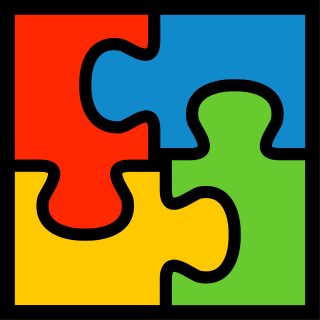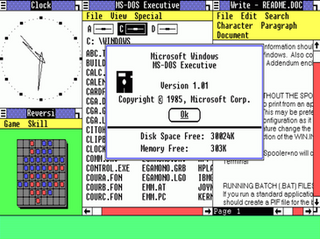Easter egg may refer to:
- Easter egg, a special egg often given to celebrate Easter
- Easter egg (media), an intentional hidden message
Easter egg may refer to:
Con or CON may refer to:

Easter eggs, also called Paschal eggs, are eggs that are decorated for the Christian feast of Easter, which celebrates the resurrection of Jesus. As such, Easter eggs are common during the season of Eastertide. The oldest tradition, which continues to be used in Central and Eastern Europe, is to use dye and paint chicken eggs.

Microsoft Excel is a spreadsheet editor developed by Microsoft for Windows, macOS, Android, iOS and iPadOS. It features calculation or computation capabilities, graphing tools, pivot tables, and a macro programming language called Visual Basic for Applications (VBA). Excel forms part of the Microsoft 365 suite of software.
In computing, Xyzzy is sometimes used as a metasyntactic variable or as a video game cheat code. Xyzzy comes from the Colossal Cave Adventure computer game, where it is the first "magic string" that most players encounter.
A hidden message is information that is not immediately noticeable, and that must be discovered or uncovered and interpreted before it can be known. Hidden messages include backwards audio messages, hidden visual messages and symbolic or cryptic codes such as a crossword or cipher. Although there are many legitimate examples of hidden messages created with techniques such as backmasking and steganography, many so-called hidden messages are merely fanciful imaginings or apophany.

An Easter egg is a message, image, or feature hidden in software, a video game, a film, or another — usually electronic — medium. The term used in this manner was coined around 1979 by Steve Wright, the then-Director of Software Development in the Atari Consumer Division, to describe a hidden message in the Atari video game Adventure, in reference to an Easter egg hunt. The earliest known video game Easter egg is in the 1973 video game Moonlander, in which the player tries to land a Lunar module on the moon; if the player opts to fly the module horizontally through several of the game's screens, they encounter a McDonald's restaurant, and if they land next to it the astronaut will visit it instead of standing next to the ship. The earliest known Easter egg in software in general is one placed in the "make" command for PDP-6/PDP-10 computers sometime in October 1967–October 1968, wherein if the user attempts to create a file named "love" by typing "make love", the program responds "not war?" before proceeding.
The Konami Code, also commonly referred to as the Contra Code and sometimes the 30 Lives code, is a cheat code that appears in many Konami video games, as well as some non-Konami games. In the original code, the player has to press the following sequence of buttons on the game controller to enable a cheat or other effects:

Adventure is a video game developed by Warren Robinett for the Atari Video Computer System and released in 1980 by Atari, Inc. The player controls a square avatar whose quest is to explore an open-ended environment to find a magical chalice and return it to the golden castle. The game world is populated by roaming enemies: three dragons that can eat the avatar and a bat that randomly steals and hides items around the game world. Adventure introduced new elements to console games, including enemies that continue to move when offscreen.

The Office Assistant is a discontinued intelligent user interface for Microsoft Office that assisted users by way of an interactive animated character which interfaced with the Office help content. It was included in Microsoft Office for Windows, in Microsoft Publisher and Microsoft Project, Microsoft FrontPage, and Microsoft Office for Mac. The Office Assistant used technology initially from Microsoft Bob and later Microsoft Agent, offering advice based on Bayesian algorithms.
about is an internal URI scheme implemented in various Web browsers to reveal internal state and built-in functions. It is an IANA officially registered scheme, and is standardized.

Microsoft Office 97 is the fifth major release for Windows of Microsoft Office, released by Microsoft on November 19, 1996. It succeeded Microsoft Office 95 and was replaced by Microsoft Office 2000 in 1999. A Mac OS equivalent, Microsoft Office 98 Macintosh Edition, was released on January 6, 1998. Microsoft Office 97 became a major milestone release which includes hundreds of new features and improvements over its predecessor.

An egg hunt is an Eastertide game during which decorated eggs or Easter eggs are hidden for children to find. Real hard-boiled eggs, which are typically dyed or painted, artificial eggs made of plastic filled with chocolate or candies, or foil-wrapped egg-shaped chocolates of various sizes are hidden in various places; as many people give up sweets as their Lenten sacrifice, individuals consume them after having abstained from them during the preceding forty days of Lent.

Windows 1.0 is the first major release of Microsoft Windows, a family of graphical operating systems for personal computers developed by Microsoft. It was first released to manufacturing in the United States on November 20, 1985, while the European version was released as Windows 1.02 in May 1986.
Computer humour, also known as hacker humour, is humour on the subject of computers or their users.
The jdbgmgr.exe virus hoax involved an e-mail spam in 2002 that advised computer users to delete a file named jdbgmgr.exe because it was a computer virus. jdbgmgr.exe, which had a little teddy bear like icon, was actually a valid Microsoft Windows file, the Debugger Registrar for Java.
The Dinosaur Game is a browser game developed by Google and built into the Google Chrome web browser. The player guides a pixelated Tyrannosaurus rex across a side-scrolling landscape, avoiding obstacles to achieve a higher score. The game was created by members of the Chrome UX team in 2014.

Surf is a browser game developed by Microsoft that is shipped with the Microsoft Edge web browser. In the game, the player must control a surfer as they move across a body of water while also collecting power-ups and evading obstacles and a kraken. The game features three game modes, has character customization, and supports keyboard, mouse, touch and gamepad controls.